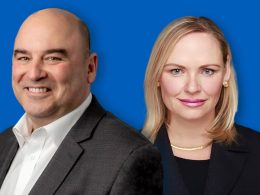by Olly Ludwig and Cinthia Murphy, IndexUniverse.com
Tim Buckley started his career at Vanguard as founder and chairman John Bogle’s research assistant, so perhaps his appointment to succeed Gus Sauter as the company’s chief investment officer on Jan. 1 should come as no surprise. Buckley is infused with the gracious ‘put-the-client-first’ ethos that Bogle pioneered and, as important, seems to embrace Bogle’s “costs matter hypothesis” with every cell in his body.
While Buckley is quick to point out he will never quite fill Sauter’s shoes, who retires as CIO at the end of the year as one of the giants of the world of indexing, make no mistake: Vanguard is as ready for a CIO like Buckley as Buckley is ready to be CIO. In fact, Buckley is the only executive at Vanguard who will have served as CIO twice—first as chief information officer since 2006 and now as chief investment officer.
It’s a quirky biographical detail, but also a measure of how involved Buckley has been in Vanguard’s steady rise to the top of the money-management and indexing industry and how germane his broad skill set is to Vanguard’s future. When he arrived in 1991, Vanguard had $60 billion in assets under management and indexing made up 2 percent of all invested assets. It now has $2.3 trillion in assets and indexing makes up 20 percent of all assets, and more than half of Vanguard’s. In short, indexing is blossoming, and it’s hardly a stretch to suggest that Buckley—an unequivocal believer that the ETF has an exceedingly bright future—will be a perfect CIO to lead the company that led the passive revolution.
IndexUniverse: Let's start with the question that was last on our list: How do you think you will be different than Gus in this chief investment officer role?
Tim Buckley: Well, let’s start off with Gus. He’s a legend. I would argue that he’s the architect of indexing as we know it today, he is the guy that’s taken it mainstream—everything from the importance of costs, the importance of transaction costs, index construction, to how indexes should be used in somebody’s portfolio or in target date funds. You name it. So, Gus is a legend, so I won't even pretend to walk in his shoes.
My aim is to continue his success. What I can tell you is that we are very similar in terms of purpose, of putting the investor first. We get excited about people saving for their retirement; about giving them a better shot of doing that; and about helping people who are looking to put their kids through college. We can help them get there. We have the same investment philosophy, and we have the same appreciation for talent. Where we are different, it would be complementary.
IU: From what we hear, Gus is more of a number cruncher in a portfolio management kind of way whereas you are a number cruncher in more of that MBA/business enterprise kind of way. Do you agree with that general observation?
Buckley: Gus has incredible technical knowledge—the depth of his technical knowledge will never cease to amaze anybody here. Fortunately, he has passed that onto his team. So he has a great appreciation for micro-market structure, for transaction costs, and even for rebalancing a portfolio. That has been passed onto the team that he has built.
Leave it to me to now bring a strong client perspective to the team. I’ve been in this business for 21 years—involved in the investment side, but also very involved on the client side. I can bring that client perspective to what we do, as well as how to harness the power of the team that he has created. And there are a lot of things that we want to do to continue this success, as we build out further infrastructure—whether they're systems, or it’s standardization of process—to make sure that, as we go global, we’re all using the same best practices.
IU: How do you think Vanguard has changed in the last 10 to 20 years?
Buckley: You're talking about a firm that was about $60 billion when I joined in 1991, and now it is $2 trillion dollars. And today, our costs are about 60 percent lower for investors than they were in 1991! The services have also changed over the years. You can go Vanguard.com and you see a fabulous website to interact with your portfolio and self-provision. That didn’t exist 20 years ago; it was a 1-800 number. Our growth in the advisor business has also changed whom we serve—we can access a lot more investors and really help advisors serve those investors. And we are looking at expanding internationally. So, the company has changed immensely.
Product-wise, target date funds were a huge change for us. Indexing was always core to who we are, and ETFs have been a big revolution in that sense. ETFs, for us, are just another way to index.
IU: So, over the next five or 10 years, do you see Vanguard moving more and more in a Schwab-like direction, getting into different pockets of the financial services industry, but bringing your at-cost philosophy and disrupting the party for a lot of other players?
Buckley: I think what you can count on is that we’ll continue to lower costs each and every year. That’s who we are—it is core to what we do. We’re owned by our investors and that’s the way we pass on our success. Other companies, when they earn a profit in what they do, they pass it on to their public shareholdersor on to a private family. When we achieve scale– or make a profitable investment in our business, we pass it on to our clients Whatever we go into, we’re going to make sure we’re best in class, and we’re going to make sure that we can be the lowest cost player out there.
IU: What you’re saying is that whatever you do, you will hew to your core approach.
Buckley: Whatever we do, we’ll hew to our core approach. And you’ll see us take our message more globally. We’re becoming a bigger and bigger player in Europe and the UK market. We have had a great operation in Australia and we’ll be expanding more into Asia. So our low-cost message will continue here, but also it can spread to other countries as well.
IU: What is your core investment philosophy?
Buckley: It’s one that, if you’ve talked to anyone at Vanguard, it’ll sound familiar. It’s really burned into our DNA here. Essentially, you would start with putting the client first, really. It’s our structure. It’s how we’re owned. We don’t serve outside shareholders or a private family. We serve our clients, the people who own our funds.
Our philosophy is to keep costs and turnover low, because we know that’s what eats away at your retirement. Keep the costs low, and you keep more of your return. And turnover—we know the inefficiencies of it from a tax standpoint, and from a portfolio cost standpoint. We keep the long-term perspective not only in investing, but also with our own business. And from a product perspective, we offer diversified products based on enduring principles. We avoid the fads and the niches.
IU: What are the areas of the market that you might consider prospective? People wonder if Vanguard would ever, for example, look at China as a separate entity, kind of moving a little bit away from that broad indexing approach. Or, sticking to broad indexing, how about marketing a fund with a fundamental RAFI index from Rob Arnott’s firm?
Buckley: It’s better to stick to principles of diversification. First, a market should be of sufficient size when you look at the global market cap. If you're getting into a single country fund has a smaller market cap than Apple, for instance, then you may be in something that’s too risky. And that’s probably not a product we’re rolling out. So, it has to be big enough—and diversified enough.
From the other perspective, people have different ideas of what an index is. Is that a tilt in a certain way to try to outperform what would be the traditional index? Is it putting an active perspective on how to outperform? All these questions point to a philosophical difference, and while I’m not saying that those strategies are necessarily wrong, they're just not what we believe are true indexing strategies.
IU: That leads into the question of active management at Vanguard. Wellington looms largely as one of the most amazing active portfolios, so I presume you're going to say active management works. But can you tell me, where and when?
Buckley: We firmly believe in active management. We believe that advisors can have alpha. But it’s not so large that you can charge whatever you want. Alpha is easily destroyed with high expenses. So we take the same approach to active management that we do to indexing: We believe in low-cost investing. And we believe in keeping turnover low to keep it tax efficient as well.
So, if you look at that, if you look at low-cost investing, and you look at active management, has it worked? Well, if you look at our funds vs. their peers, and you look over a longer period, 10 years, about 80 percent of our funds are in the top two quartiles of performance relative to their peers. And if you look at our active equity funds over 30 years, and you look against benchmarks, they have outperformed those benchmarks. But it’s not by such a wide margin that you wouldn’t destroy that with higher expenses. In fact, they have outperformed their benchmarks, net of fees. But, if you had industry-level fees in there, you would have underperformed.
The key here is keep costs lower. Where do you start to use active management? I always tell people, first of all, get your asset allocation right. Figure out your risk profile. Then wed yourself to the belief that you are going to rebalance. Now you’ve taken care of the most important things in your portfolio. Only then do you decide whether you want to take on a little extra risk, which is active management.
IU: How would you distinguish between the role of an ETF and a mutual fund in an investor portfolio?
Buckley: From a Vanguard perspective, I’m indifferent. It’s really about which one you choose. For a long-term investor, there are very little differences. If you're coming to Vanguard, if you're coming in and you’ve got $10,000 dollars to invest, your pricing will be the same. Your services might be slightly different if you're one of these people who like to do automatic investment plans. Those services have been built up through the years around mutual fund platforms and around traditional mutual funds, so there are some slight service advantages to the traditional fund. But, if you value intraday liquidity—which is a tough argument for a 30-year-horizon or 20-year-horizon investor—then an ETF makes sense. And, at the end of the day, sometimes the ETF is just more convenient. It’s a preference thing.
IU: These infrastructure issues and services that you alluded to as an advantage for mutual funds, do you think that will be minimized in the coming years? The most tangible example I can serve up is this context is ETFs finding a place in 401(k)s. If there's an infrastructure that’s totally designed around the mutual fund, it would be the 401(k) architecture, and that has been an impediment for the ETF.
Buckley: Yes! Well if you and I were talking in two years, we would not even be mentioning the difference—the same good long-term investing services that have been built out around funds through the years will apply to ETFs. People will figure out the infrastructure challenges. That will be done.
IU: Do you think that the ETF could supplant the mutual fund over the long term?
Buckley: Well, indexing is about 20 percent of all assets and ETFs are currently the way people are choosing to index. It’s where the growth is coming from. But, for them to supplant mutual funds, indexing would have to become 60 percent of the industry. Or, active ETFs would have to take off. And I just don’t see the same bright future for active ETFs, because there's just too much transparency required for an active ETF manager. I think we’re in a world where you just live with both.
IU: How do the goals you set as an individual and as an executive compare with what Vanguard is asking of you?
Buckley: Well, they're one and the same for me. What they expect is what I will hopefully deliver. First, you play a role in ensuring the consistency of the investment philosophy, and you're not alone in that. We have a team of people who are working towards that.
Secondly, evolve the product lineup. Investor needs are changing—the great financial crisis has probably changed risk profiles. We’ll see how long those last. And we have a whole generation of people retiring. How will their needs change over time? And how can we evolve to better meet those needs? As CIO, you play a lead role in ensuring our product lineup is best suited to meet those needs.
Talent is a huge part of the role. If you look at the investment professionals here, if you look at some 300 investment professionals, how do you ensure that the pipeline coming in is as robust as possible? Are you developing that talent in the way you should be developing that talent?
And then there is infrastructure. You’ve got to make sure that you're using the best systems, the best practices across the board, across the globe. And that’s an ongoing process.
So, if you think about the CIO role that’s the way it is here at Vanguard. What it is not is sitting back and making big macro calls. Gus does not sit back and say, “Well, here is what I think is going on with interest rates. And here is where I think we should move the bond portfolio.” That is not the role here.
IU: That goes right to the center of indexing. So, what are you most excited about regarding your position?
Buckley: Well, when I came into this industry in 1991 indexing was 2 percent of industry assets. Now it’s over 20 percent, so it’s mainstream. My first job was actually working with Jack Bogle and I would do a lot of studies on costs, and he’d be doing a lot of speeches on costs and the importance of costs. And they seemed to fall on deaf ears. Now costs matter. You can see it in the behavior of investors. You can see it in the behavior of competitors.
That’s just a great environment for Vanguard. So I’m excited to push on those messages of low costs and the importance of indexing. I also think we are still nascent in how we serve the advisor market. This is a market that is going fee-based, and I think fee-based advisors will change and will continue to push indexing. They’ll change how advice is provisioned, and we can serve them well. That is an exciting market for us.
The global market is an exciting market for us to push this message of long-term, low-cost investing. And then, in our traditional world of the direct client, of the retirement client, there are a lot of great things happening with technology. And, as a virtual company, that means you can roll out low-cost services that you couldn’t otherwise. And we’ve done it with advice. And we’ll do it more in the future.
IU: In that vein, what changes do you feel need to happen at Vanguard?
Buckley: We’re never complacent. I sat down with Gus, and said, “Gus, what are the things that are working well that should continue? What are the things that you wanted to change?” From that perspective, continuing his success is job No. 1. After that, there's a build-out of the talent pipeline and the infrastructure. As we expand, these are necessary investments.
The focus on costs is going to continue. There's going to be fee pressure across the board. We can't rest. Just because we lead in low cost, we can't rest. Our competitors are fast on our heels. And we think that’s benefiting everyone in the marketplace. It benefits investors. We will stay focused on lowering costs and rolling out high-quality services for our clients.
IU: How do you see the competitive landscape in the fund industry and the indexing industry evolving in the coming years?
Buckley: Who wins in the end when costs come down for investing? At the end of the day, investors are getting a better chance to succeed. So we want to see fees come down. We’d love to see industry fees come down. And, if we happen to be in the lead of that, that is great.
And we love to see the fee pressure. And we’ll continue to apply it ourselves going forward. Hopefully, our competitors see it the same way, so we think the industry will be shaped that way. We think fee-based advisors, they get it. The direct clients understand it. I mentioned that the landscape will change as the needs of investors change. Of course you’ve got the boomers retiring. And you’ve got young investors coming online who have a different attitude towards risk because of the great financial crisis. So we have to think about how they will invest differently. And what are there products that will meet their needs better.













